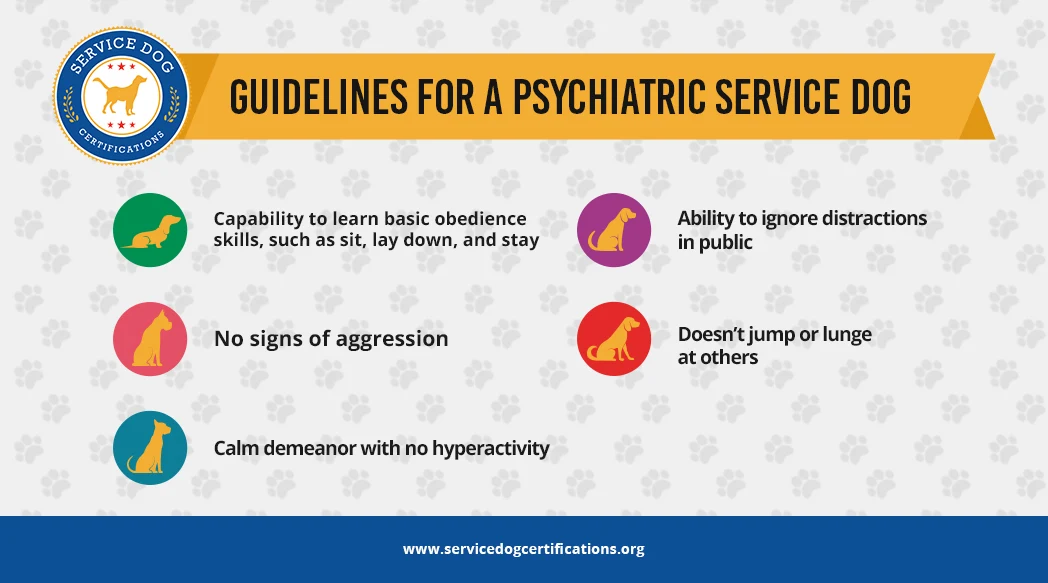How to Get a Psychiatric Service Dog (PSD)

A Psychiatric Service Dog (PSD) is a Service Animal specifically trained to support individuals diagnosed with a mental illness. A well-trained PSD is able to ease symptoms caused by the mental disability and can comfort their handler in times of distress.
In this article, we’ll cover how to be approved for a PSD, what to look for when selecting a dog, and how to train a Psychiatric Service Dog to become a handler’s life-saver.
Is there a registry for Psychiatric Service Dogs?
The Americans with Disabilities Act (ADA) does not require any registration for Service Dogs. Psychiatric Service Dogs can accompany their handlers unmarked and without any id or paperwork. However, some handlers find it reassuring to register their Service Dogs and to purchase a vest and id. It helps them to communicate that their dog is, in fact, a working Service dog, and their rights should be respected.
1) Speak with a Health Care Professional about Psychiatric Service Dogs
A Psychiatric Service Dog can only be acquired if a health professional gives a diagnosis of mental illness. According to the Americans with Disabilities Act (ADA), a Service Dog must be able to assist their handler with tasks that directly relate to their disability. To be eligible for a Psychiatric Service Dog the diagnosis may include:
- Generalized Anxiety Disorder
- Depression
- Panic Attacks
- Obsessive-Compulsive Disorder
- Post-Traumatic Stress Disorder (PTSD)
- Schizophrenia
- Agoraphobia
With this diagnosis, an individual is allowed to get a Psychiatric Service Dog and train it to complete tasks that help them with their symptoms.
2) Obtain your Psychiatric Service Dog
When starting to look for a Psychiatric Service Dog several considerations are necessary. Most dogs have the potential of being a Service Dog but not every dog can perform the tasks their handlers require to help reduce the impact of the mental disorder.
Where to find a dog
To select the perfect Psychiatric Service Dog the two most common ways are:
- Purchase from an organization that specifically trains PSDs.
- Adopt from a local animal shelter.
Either way, it is crucial to find a dog that is best suited for the work ahead. Among these considerations are the dog’s characteristics, breed as well as its age and health.
Characteristics
When choosing a dog, the handler must be aware of certain behavioral traits. While there are no specific regulations that a handler must follow, it’s important that the dog displays the following qualities:
- Eager to please
- Easily trainable
- Non-aggressive
- Accepting of strangers
- Disciplined
- Strong work ethic
Dogs with these traits tend to succeed as Service Dogs, as they want to please their handlers and enjoy learning new tasks. It is crucial to adopt a dog that enjoys working on specific tasks. It’s important not to choose a dog for the wrong reasons; handlers may need to change the PSD if they seem to be in distress while training or cannot comprehend the tasks they should perform.
A handler needs to take special consideration finding a Psychiatric Service Dog to guarantee they are a perfect fit for the challenges ahead.
Breed
With the right characteristics, any dog has the potential to become a Psychiatric Service Dog. The ADA does not restrict breeds that qualify to become a Service Animal and therefore facilities and landlords do not have the right to exclude a Service Dog based on breed. However, among the dog breeds that generally excel in this type of work are:
- Labrador Retrievers
- German Shepherds
- Border Collies
- Poodles
- Golden Retrievers
These breeds share traits, such as high levels of trainability, desire to please, intense focus, and generally good temperament. Dogs with these characteristics usually do well in training and are able to form a strong bond with their handlers.
Health and age
For any Service Animal, it is essential that they are in top health condition. Any health issue, such as diabetes or arthritis, could hinder the Psychiatric Service Dog of performing the tasks in the time needed and therefore become an additional burden in times of distress.
To get the best out of the Psychiatric Service Dog these points need to be recognized:
- An inaugural visit to the vet is absolutely needed, to make sure the dog is in top condition.
- Once the PSD is in service, taking well care of them and revisiting the vet for regular checkups is necessary.
- All Service Dogs should be neutered. This will make males less aggressive and females without distraction when in heat.
- The dog should be at least 6 months old and more importantly have outgrown the puppy phase.
If the handler understands and can accommodate these prerequisites, finding the perfect Psychiatric Service Dog is merely a matter of time. However, it’s still only halfway through the process as the next, big step of training the dog will begin.
3) Train your Psychiatric Service Dog
Each dog will respond differently to learning the tasks needed; some are naturally intuitive and already understand what their handler needs, others might require several training sessions to master the complexity of the task. Therefore, a Psychiatric Service Dog doesn’t need to attend any specific training program. The only requirement is that the PSD is trained to perform tasks that directly relate to their handler’s disability.
For example a person living with anxiety could train their Psychiatric Service Dog to detect panic attacks. The PSD would alert its owner of an upcoming panic attack, and then work to comfort and support their handler until the attack subsides.
Using a reputable PSD trainer
Handlers might want to get the help of a professional Psychiatric Service Dog trainer if they are not confident enough to do all of the training themselves.
The cost of having the PSD trained professionally will differ based on the dog’s ability to learn and the complexity of the tasks needed. Talk to several potential trainers beforehand and get an estimate of the time and effort involved. However, the benefits of having a fully dependable Psychiatric Service Dog at hand could be worth every penny spent.
When looking for a trainer, handlers should put some research into the trainers available in their region. Getting recommendations from other individuals with PSDs are a safe way to be connected with a reputable trainer.
Train yourself
If the tasks at hand are easy, or the dog and their handler already have a strong bond, training themselves could be an option. Training a service dog might start with basic commands and slowly building up the skills until the PSD knows how to behave in public and stressful situations.
It is important that the Psychiatric Service Dog has enough confidence in performing the special task even in conditions when the handler might not be able to give proper instructions. Following a strict regimen will help the PSD to learn what is needed and to perform the tasks with few to no errors.
As long as the Psychiatric Service Dog is able to complete the tasks directly related to the handler’s mental disability, it does not matter who trains them.
4) Be aware of the stipulations surrounding Psychiatric Service Dog
Per the ADA, handlers are allowed to bring their Service Dogs into pubic establishments that normally wouldn’t allow pets, such as:
- Apartment complexes
- Hotels
- Restaurants
- Movie theaters
- Retail stores and markets
Although the ADA doesn’t require Psychiatric Service Dogs to be registered, handlers can bring their PSD unmarked into these buildings. Nevertheless, some handlers do prefer to register their Service Dogs to ensure that their rights will be respected. Establishment owners are unable to legally ask if a dog is a Service Animal. They are, however, allowed to ask two questions:
- Does the dog assist the handler with a task related to their disability?
- And if so, what tasks do they perform?
Handlers should be prepared to answer the two questions but also remain aware of the limitations of what can be asked.
Patience and knowledge will lead to the perfect Psychiatric Service Dog
The path to finding and training a Psychiatric Service Dogs for the tasks needed may be long. Still, once the PSD is ready and can help their handler to overcome symptoms caused by the mental disability, the handler’s life will become safer and more fulfilling.
About the Author: The writing team at Service Dog Certifications is made up of folks who really know their stuff when it comes to disability laws and assistance animals. Many of our writers and editors have service dogs themselves and share insights from their own experiences. All of us have a passion for disability rights and animals.
26 comments
Leave a Reply Cancel reply
Latest Posts

Dangerous Materials Hiding in Your Dog Products
Jake’s German Shepherd began developing strange rashes around his collar. Three vet visits later, they figured out the leather was treated with chromium — a chemical that irritates sensitive skin. Jake had no idea his dog’s collar contained industrial chemicals. Most dog owners don’t know what goes into the products they buy. Many companies use […]

Read More

Can You Bring a Service Dog to a Basketball Game?
Yes, you absolutely can bring your service dog to basketball games. Whether you’re heading to your local high school tournament, a packed college rivalry game, or splurging on NBA tickets, the Americans with Disabilities Act protects your right to be accompanied by your service dog anywhere the public can go. When you arrive, venue employees […]

Read More

Best Pet Health Insurance Providers
If you own a pet, you know how important — and expensive — vet care can be. One way to offset those costs is to purchase pet health insurance. Like typical health insurance, pet insurance is available at many price points, and can cover all, most, or only some of your vet-related costs. It can […]

Read More



I have PTSD, anxiety disorder and bipolar. My dog Kaos helps me when I’m down. I also black out when my anxiety gets to severe and I have a bad panic attack he stays by my side to make sure I’m safe. He is an American Pit Bull Terrier which are not currently allowed in my apartment complex without being PSD. I do need him registered.
how is it going Tina? Wondering because I just got a pitbull mix as well and really need a place to stay, my most probable option is a no pet apt building…. did they accept a simple “service dog certification” as shown above or no?
How can you hold any ESTABLISHMENTS that violates the law for service dog by denying them access
Looking for a trainer in Wisconsin….
How are you supposed to prove your dog does these tasks. How does anyone know he’s trained. It’s easy with a seeing eye dog but how do you prove he responds to your need. Supposed someone has panic attacks – you can’t create one to prove your dog relieves it?
I was thinking the same thing but my dog has learned (maybe through 4 years of experience with me and my panic attacks and how she’s treated for helping me) that this is how they get “trained”.
I have severe PTSD, anxiety, depression, panic attacks, anxiety attacks. I get them at school a lot but I don’t know if they would allow me to bring a PSD dog to my middle school, I don’t know if it’s against Oregon law.
PSDs are recognized as service animals in Oregon. However, to qualify for a PSD, your mental health condition must be considered a disability, and the dog must be trained to perform a task relating to your disability.
I have been looking at Rescue sites for awhile…so what should come first fill out the paperwork & get a letter from my doctor or get a dog beforehand…thank you for sharing….and please elaborate..
Licensed healthcare professionals who write PSD letters only address the mental health of the person and whether they meet the definition of “disability”. PSD letters can be obtained before or after acquiring or training a service dog.
Thank you so much for your information. I have most of the symptoms above and I have three dogs I rescued that I would love to make as my therapy dog(s).
hey so i have a question,so i have recently been in a mental hospital because of my anxetiy suicidal thoughts and my deppression but i dont think my thearapist will alow me to get one i also have a panic disorder so do i get and train the dog and then try to get papers?
You do not need any “papers” for a service dog. The key to qualifying for a service dog is having an eligible disability, and having a dog that has been trained to perform a job or task relating to that disability.
Would love to get my pit registered she already knows how to calm me during ptsd attacks and agoraphobia
There is no need to register a psychiatric service dog. For info on PSD letters please see this link: https://www.servicedogcertifications.org/psd-letter/
I am very interested in having my dog certified. Please advise me of the process. Thank you
You do not need to certify a PSD. You can obtain a PSD letter if you choose, for more info please see this link: https://www.servicedogcertifications.org/psd-letter/
How much is all of this?
If you’re inquiring about a PSD letter, please see this link for more info: https://www.servicedogcertifications.org/psd-letter/
How do I obtain a psd for my dog?
If you are referring to a PSD letter, please see this link: https://www.servicedogcertifications.org/psd-letter/
I don’t have a dog that I’m looking to get a certified/trained. All I have is c-PTSD, my legs shake all night and I have a panic attacks almost daily. I’ve tried a number of modalities to help myself to no avail. I do have a huge phobia of medication (and for good reason because when I finally caved in and gave a couple things a try out of desperation, it just tore my stomach up even worse anyway). I never thought of a dog until I babysat someone’s dog last week (1 night / 2 days) and it was like some kind of miracle effect. I have not felt safe or calm in my body for over 10yrs, but somehow just in those 2 days I felt like normal human again, no panic attacks, my breathing was just normal the entire week it was amazing. My legs were not shaking at night it was extraordinary. I actually cried and thanked the dog that last morning. He licked my face and just sat right in my lap, I’d never experienced such pure kindness in my life. Unfortunately, that angelic dog has his own family he belongs to so obviously he can’t come live with me. But now I’d like to know how I could go about getting a psychiatric assistance dog. Why don’t I just go to the pet store and get any dog? Well I’m scared because I also know if I don’t know what I’m doing and her a dog that’s not already with calm energy maybe I’ll just have a bad effect on the dog (as in if it were a new puppy without establish energy, I’ll probably just make him a neurotic anxious mess like me) I wouldn’t want to inadvertently do that to a dog plus if I transmit my fear on him, those dogs become scared/get snappy etc. they can become dangerous to people.
Our recommendation is to discuss your needs with both your healthcare provider and a trainer to see if and how a service dog could assist you. Another option you might want to explore is an emotional support animal. ESAs help people with mental health conditions but do not have the same stringent training requirements as service dogs: https://www.servicedogcertifications.org/emotional-support-dog-certification-registration/
Ohhh darling – first of all come sit down and let me give you a hug. Secondly, have faith in yourself – write down what qualities you are looking for in a dog and BEFORE you get any dog research the breed – good and bad – crunch the numbers – ask your local vet – put love out there and you will be joined with your forever friend
I’ve talked to my psychiatrist about an ESA, but I want to talk to her about a PSD. I’m scared to and I don’t know how to ask for one. What do I say?
A PSD letter is similar to an ESA letter in that it confirms you have an eligible mental health disability. However, you must train a PSD to perform a job or task to help with your disability. Your psychiatrist will not be able to help with that part.